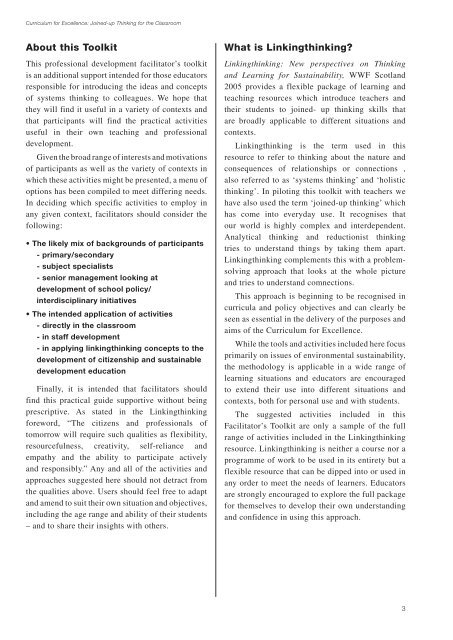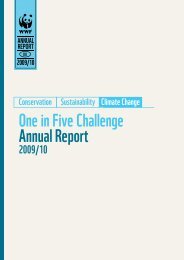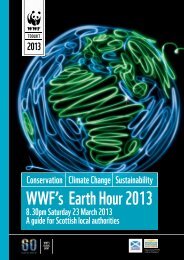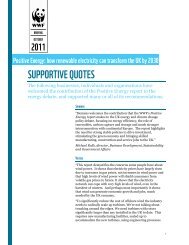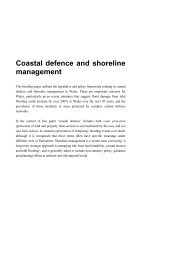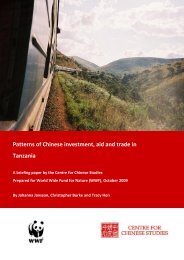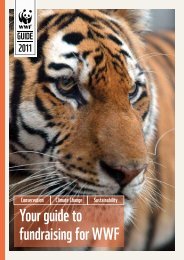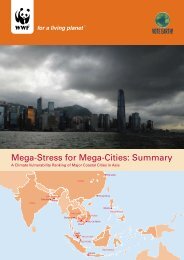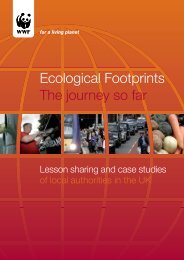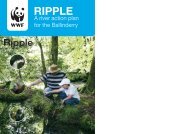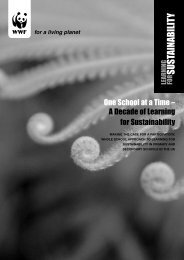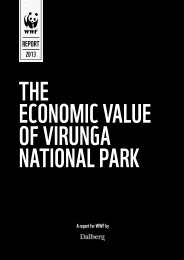Curriculum for Excellence: Joined-up Thinking for the ... - WWF UK
Curriculum for Excellence: Joined-up Thinking for the ... - WWF UK
Curriculum for Excellence: Joined-up Thinking for the ... - WWF UK
- No tags were found...
You also want an ePaper? Increase the reach of your titles
YUMPU automatically turns print PDFs into web optimized ePapers that Google loves.
<strong>Curriculum</strong> <strong>for</strong> <strong>Excellence</strong>: <strong>Joined</strong>-<strong>up</strong> <strong>Thinking</strong> <strong>for</strong> <strong>the</strong> ClassroomAbout this ToolkitThis professional development facilitator’s toolkitis an additional s<strong>up</strong>port intended <strong>for</strong> those educatorsresponsible <strong>for</strong> introducing <strong>the</strong> ideas and conceptsof systems thinking to colleagues. We hope that<strong>the</strong>y will find it useful in a variety of contexts andthat participants will find <strong>the</strong> practical activitiesuseful in <strong>the</strong>ir own teaching and professionaldevelopment.Given <strong>the</strong> broad range of interests and motivationsof participants as well as <strong>the</strong> variety of contexts inwhich <strong>the</strong>se activities might be presented, a menu ofoptions has been compiled to meet differing needs.In deciding which specific activities to employ inany given context, facilitators should consider <strong>the</strong>following:• The likely mix of backgrounds of participants- primary/secondary- subject specialists- senior management looking atdevelopment of school policy/interdisciplinary initiatives• The intended application of activities- directly in <strong>the</strong> classroom- in staff development- in applying linkingthinking concepts to <strong>the</strong>development of citizenship and sustainabledevelopment educationFinally, it is intended that facilitators shouldfind this practical guide s<strong>up</strong>portive without beingprescriptive. As stated in <strong>the</strong> Linkingthinking<strong>for</strong>eword, “The citizens and professionals oftomorrow will require such qualities as flexibility,resourcefulness, creativity, self-reliance andempathy and <strong>the</strong> ability to participate activelyand responsibly.” Any and all of <strong>the</strong> activities andapproaches suggested here should not detract from<strong>the</strong> qualities above. Users should feel free to adaptand amend to suit <strong>the</strong>ir own situation and objectives,including <strong>the</strong> age range and ability of <strong>the</strong>ir students– and to share <strong>the</strong>ir insights with o<strong>the</strong>rs.What is Linkingthinking?Linkingthinking: New perspectives on <strong>Thinking</strong>and Learning <strong>for</strong> Sustainability, <strong>WWF</strong> Scotland2005 provides a flexible package of learning andteaching resources which introduce teachers and<strong>the</strong>ir students to joined- <strong>up</strong> thinking skills thatare broadly applicable to different situations andcontexts.Linkingthinking is <strong>the</strong> term used in thisresource to refer to thinking about <strong>the</strong> nature andconsequences of relationships or connections ,also referred to as ‘systems thinking’ and ‘holisticthinking’. In piloting this toolkit with teachers wehave also used <strong>the</strong> term ‘joined-<strong>up</strong> thinking’ whichhas come into everyday use. It recognises thatour world is highly complex and interdependent.Analytical thinking and reductionist thinkingtries to understand things by taking <strong>the</strong>m apart.Linkingthinking complements this with a problemsolvingapproach that looks at <strong>the</strong> whole pictureand tries to understand comnections.This approach is beginning to be recognised incurricula and policy objectives and can clearly beseen as essential in <strong>the</strong> delivery of <strong>the</strong> purposes andaims of <strong>the</strong> <strong>Curriculum</strong> <strong>for</strong> <strong>Excellence</strong>.While <strong>the</strong> tools and activities included here focusprimarily on issues of environmental sustainability,<strong>the</strong> methodology is applicable in a wide range oflearning situations and educators are encouragedto extend <strong>the</strong>ir use into different situations andcontexts, both <strong>for</strong> personal use and with students.The suggested activities included in thisFacilitator’s Toolkit are only a sample of <strong>the</strong> fullrange of activities included in <strong>the</strong> Linkingthinkingresource. Linkingthinking is nei<strong>the</strong>r a course nor aprogramme of work to be used in its entirety but aflexible resource that can be dipped into or used inany order to meet <strong>the</strong> needs of learners. Educatorsare strongly encouraged to explore <strong>the</strong> full package<strong>for</strong> <strong>the</strong>mselves to develop <strong>the</strong>ir own understandingand confidence in using this approach.


